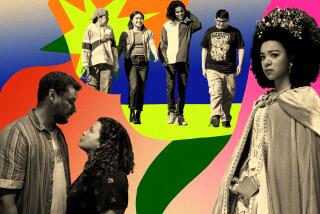‘Reality’ Meets the Grim New Reality
- Share via
Normalcy accelerates healing, making television-as-usual a fine thing for a badly wounded nation hearing the terrible thunder of war.
It was swell seeing baseball on TV again, balls again flying out of the park, nasty curveballs still nasty, pitchers getting right to it and not taking five miles an hour off of their fastballs.
It was comforting, as well, watching Monday night’s return of David Letterman on CBS, the irreverent comic reborn for the moment as a tortured observer trying mightily to define his own feelings in a monologue notable for its aching sincerity.
And the new TV season? Even in dribbles and drabbles, bring it on, too.
With America’s real-life miseries still echoing, though, how will most viewers respond to “Survivor” and other faux reality shows that demand empathy for camera-ready adventurers hungering for pots of gold? You know, the ones who are ready for their close-ups, volunteering to leave their comfort zones and face minor manufactured adversity in back-stabbing pursuit of regular TV gigs and huge financial gain.
Will viewers regard these as they do other escapist shows? Will viewers treasure them as sanctuaries from the sadness of body bags and overwhelming grief generated by last week’s terrorist attacks? Will viewers again suspend disbelief and wring their hands in despair when one of these taped-for-prime-time crybabies misses a meal on the screen, gets bitten by a bug or suffers an injury through carelessness in some isolated outback where the greatest danger they usually face is tripping over TV cable?
Or will viewers be resistant after experiencing through TV a holocaust and infinite personal tragedies that at once traumatized and energized much of America? Will they now see these shows as indulgent exercises that grant attention and pity to those who least deserve it, and in doing so trivialize real pain and suffering?
Is something repulsively wrong with this picture?
Flash back briefly to a day last season when “The Early Show” on CBS was convening its weekly “Survivor II Roundtable,” following the previous night’s episode, which co-host Jane Clayson proclaimed “reality TV at its best.” She added emphatically: “Drama, drama, drama.”
The occasion? A “Survivor” Kucha Tribe member, she reported somberly, “seriously burned his hands while tending a fire.” Actually, this accident in the boonies of Australia had been taped months ago. As if it really did occur the previous evening, though, CBS News cut to footage of the victim in pain, being carried off on a stretcher as a sobbing Kucha colleague buried her head in someone’s chest.
Back to the panel. “The range of emotions was more complex than the previous episodes we’ve seen,” an anthropologist weighed in. Soon a thoughtful Clayson was wondering aloud: “What goes through the mind of the tribe after something like this?”
In that more innocent time, some Americans surely stroked their chins along with her. Would they now?
All right, the burns turned out to be second degree, nothing to sniff at. What’s more, the same Clayson who performed those verbal somersaults on behalf of “Survivor” is part of a CBS News corps that performed magnificently--as has nearly all of TV news--in the challenging week after those devastating terrorist attacks.
And what a difference a few months make.
“Islamic terrorists in Afghanistan are deciding whether to hand over Osama bin Laden,” she began Tuesday’s morning show beside co-host Bryant Gumbel, giving about equal stoniness to this story as that “Survivor” episode of last season.
A bit later in Tuesday’s program, she interviewed a trauma expert at length, her questions about America’s present grief carrying about the same gravity she had conveyed with that anthropologist in dissecting “Survivor II.”
Only the tribe this time is an entire nation.
The point here is not Clayson, of course, but the unmerited significance that is attached to the network’s hugely successful “Survivor” franchise and its ilk.
Will the network’s morning news program--and its affiliates nationwide--bequeath “Survivor III” the same bells and whistles, one wonders, treating the show’s tears as major news and getting worked up over its petty crises?
If so, how will viewers respond, especially those who watched Monday night’s “Late Show With David Letterman,” on which an emotional CBS News anchor Dan Rather broke up while recalling his visit to the demolished World Trade Center, and later wept as he recited a verse of “America the Beautiful.”
Despite his seriousness as a journalist with wide experience covering epic stories, the tightly wired Rather’s personality tics and oft-odd anchorisms have always been easy to ridicule. And his explanation of the terrorists’ motives was disappointingly simplistic, especially as he had just completed anchoring a “60 Minutes II” that eloquently addressed the concerns of Afghanis about the United States. Yet the anguish viewers saw pouring from him Monday night was the anguish of the multitudes.
Major networks and news channels were on the air live Tuesday morning with President Bush’s remarks from the Rose Garden noting, with great appreciation, the herculean rescue effort in New York and urging Americans to continue giving to charities.
Preceding Bush, though, was one of those screeching juxtapositions for which TV is notorious. It came when CBS ran a promo for a now-airing “Survivor” progeny titled “The Amazing Race,” with one of its inconvenienced players--poor baby--vowing, “I’m not going to quit.” Immediately following on KCBS in Los Angeles was a jolt of life as it really is--a plea for funds from the American Red Cross.
Prime time’s realism versus America’s realism, impossible to reconcile. Applying here is the word that Rather once used to end his newscasts.
Courage.
*
Howard Rosenberg’s column normally appears Mondays and Fridays. He can be contacted via email at howard.rosenberg@latimes.com.
More to Read
The complete guide to home viewing
Get Screen Gab for everything about the TV shows and streaming movies everyone’s talking about.
You may occasionally receive promotional content from the Los Angeles Times.






